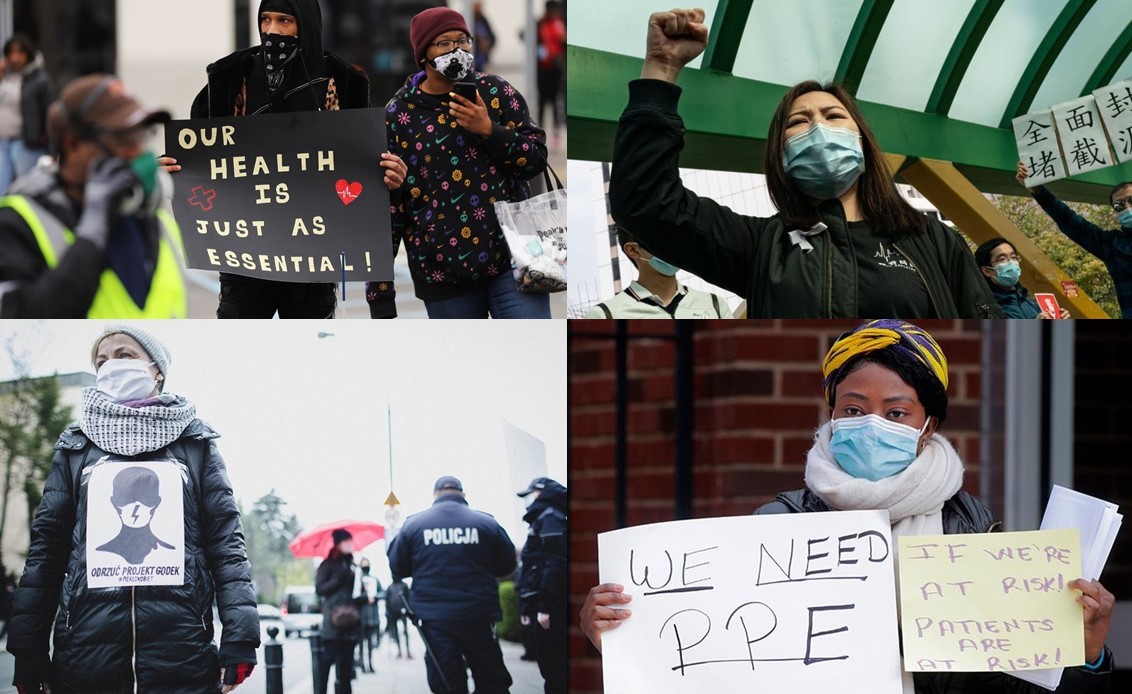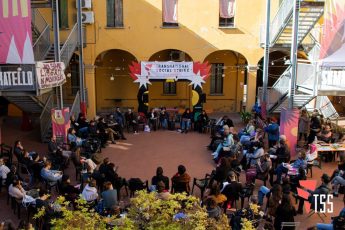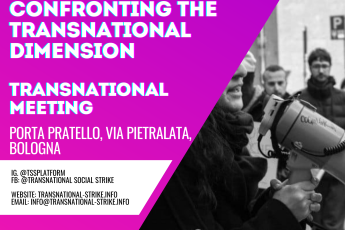
by TRANSNATIONAL SOCIAL STRIKE PLATFORM
The task to come
The coronavirus pandemic is showing global interconnectedness and interdependence. The virus, as well as its economic and social consequences, does not stop at any border. From any point of view, this crisis demonstrates that it is impossible to consider states and cities as self-sufficient or isolated. At the same time, with the pandemic, the transnational space emerges as the primary space of protests and strikes against bosses’ claims to put profits before lives. Those who are in the front row in the containment of the virus – nurses; medical staff; care workers; cleaners – as well as logistic and industrial workers are united by the refusal to sacrifice their life – and public health – on the altar of capital’s needs. Now that the threat of contagion seems to diminish in several countries, a field of conflict is opening on how we will go back to normal. We think that we need to question together the conditions that will be forced on us in this restart of production and social intercourse. In this new “normality” to come transnational communication is what is at stake. We can get out of the crisis even more fragmented and divided than we entered it or take up the chance to build common strategies that recognize this transnational dimension. What we need is not just to daydream about possible futures, but to build on the multifarious forms of resistance and struggle that have been going on in the last months to enlarge our capacity to fight back against the power of capital. What is at stake now is how to establish a transnational initiative that interweaves these struggles, advancing on three major political terrains: the strike as our weapon; migrants’ freedom from the blackmail of documents; women’s revolt.
If our lives have no value, we strike!
From Northern Italy, where first the pandemic hit hard in Europe, to the US, which rapidly became the global center of the pandemic, from Mexico to Ghana, from India to Brazil workers have taken their destiny in their hands. While politicians were reluctant to enforce strict lockdown on production and employers voiced their criminal drive to keep factories functioning, wildcat strikes, walkouts, and protests are forcing governments to act and companies to accept compromises. While some workers are forced to keep working because they can’t survive without a salary, even for a short time, others are not showing up and, if possible, taking sick leave with or without pay. In many warehouses, workers claimed to stop all non-essential deliveries and to distribute only primary goods. Amazon workers, taking advantage of years of transnational communication among the warehouses, protested and went on strike in Europe and the US with common statements and claims. In France they were able to force Amazon to limit its deliveries to strictly essential products. Health care workers in all continents are protesting against the lack of protective gear and against the rush of employers to restart production. Their claim is that their supposed vocation to take care of the others does not mean they are ready to work in whatever condition and at whatever cost. After the effort to curb the pandemic, workers are questioning businesses’ reopening that risk exacerbating the contagion.
All these struggles have something in common: while refusing the risks going to work in unsafe conditions entails, workers are contesting a political organization that puts profit over lives and that has ended up putting everyone’s life in danger. Workers do not want to be martyrs or national heroes, and their strike questions the very form of social reproduction that takes no consideration to collective welfare. Two very different ideas of what is essential are confronting one against the other: on the one hand the centrality of life and health, on the other, the logistics of exploitation trying to continue business as usual at whatever price. The crisis is making clear that what is safe for workers is not what is safe for capital. In this clash, states are struggling to find a balance, to respond to the health crisis, to satisfy the needs of enterprises and to prevent the explosion of social discontent by providing insufficient forms of social security and income support. While jobs described as non-essential have been only partially suspended, new labor regulations on the so-called essential jobs are being approved in France, Germany, Poland and elsewhere so that the working day can be extended to 12 hours and rest periods can be reduced. Everywhere the right of assembly and the right to strike is limited. These measures are temporary but could set a trend on further regulations beyond the current crisis.
When limitations on the right to strike become a death threat, when the precarization of labor becomes a sentence on the possibility to stay safe, the battle touches some basic grounds with the “normality” we used to live in. A “normality” that has been fueled by inequalities and exploitation and that laid the groundwork for the ongoing catastrophe in the healthcare and social sectors in countries all over the world. Workers’ struggles against employers’ show that what is at stake is not simply national safety protocols, nor new national strategies on health care and social security. Nothing can make us safe but a transnational initiative that threatens the safety of capital, turning the ongoing strikes and struggles into a collective movement to gain power and push for an overall betterment of life and working conditions.
For a mobility free from labor
A shortage of hundreds of thousands of migrant seasonal workers is bringing down the sustenance of most European countries and of those non-EU countries depending on European products. Until two months ago racist politicians were accusing migrants of coming to Europe to “steal” jobs and to live illegitimately on someone else’s welfare. Now another truth comes to the surface. The major fields of essential labor – domestic care work, sanitation, nursing, logistics and agriculture – are mainly performed by EU and non-EU migrant workers. In the UK, the virus has materialized Brexit before the enforcement of the promised immigration law based on the strict limitation of incoming migrants. Many European countries, including the UK, are lamenting the lack of migrant workers, mostly women, in private houses and nursing homes, and enforcing measures to circumvent the restrictions on the freedom of movement. Charter flights are being organized to bring “cheaper” labor force from one state to another (in the EU mostly from the financially struggling East to the better off West). The EU itself is discussing the creation of ‘corridors’ to allow internal migrant workers to move across the borders, but exclusively to work in agriculture, while some governments are trying to force those who have lost their jobs to apply for positions that were previously done by seasonal migrant workers. New online platforms to match supply and demand of labor in the agricultural and care sector are being envisaged, as a response both to the labor shortage and to the growing unemployment. At the same time, other migrant pickers are continuing to work in slavish conditions. Governments are now openly proposing to recruit refugees and asylum seekers to fill the vacant positions. But in the logistic and industrial sector, migrant workers – often refugees and asylum seekers living in overcrowded and unsafe reception centers which are exposed to the spread of coronavirus – are already hired to replace those workers who got sick or are refusing to work. While governments are trying to counteract the shortage of migrant labor, they are unwilling to provide migrants with income support reserved for citizens.
The centrality of migrant labor in all its variations can no longer be hidden, but we do not think that the recognition of this centrality will imply an advantage for migrants per se. On the contrary, in this situation the strict connection between visa and labor is tightening the grip of the logistics of exploitation over migrants. The never-ending violence at the EU borders, where migrants are pushed back or left to die at sea, shows how this need of migrant labor does not mean that migrants’ movements will be allowed or even become less dangerous. Rather, the health emergency is being used to justify even more selective policies. We do not think this situation can be solved through humanitarian means. In fact, for as long as the residence permit remains bound to the essentiality of this or that job, migrants will be both exposed to dangerous journeys and constantly at the mercy of the fluctuations of the labor market and the changing needs of capital. In this situation we see that while proposals of temporary regularization emerge, racist propaganda that wants migrants back where they came from, and that rejects freedom of movement, lives together with and strengthens another mantra: let’s bring migrants to where they are needed, for the time they are needed, but nowhere else. This vision for years discussed by the EU and its MSs and tested with bilateral agreements with non-EU countries, is being reinforced by the present crisis. The picture of the transnational space that is building in front of us is thus one where labor can be moved and managed according to the needs of capital, and the possibility to move independently from those needs is not even up for discussion. This picture is connected to the overall conditions in which the crisis will be handled not only for migrants but for all those who lost their jobs or need to fight against cuts in wages and harshening of the working and social conditions. We believe that this situation urges us to reclaim freedom of movement and the end of national and supranational migration laws separating migrants as a more disposable labor force. We need to break the national cage and demand a common European visa detached from wage and labor, to connect any site of initiative and resistance in Europe or at its borders in a common struggle against the global chains of exploitation.
Women’s revolt in the crisis of social reproduction
Many women are compelled to stay home, with intensified workloads due to the necessity to perform productive and reproductive labor simultaneously, sometimes under the threat of increasing domestic violence, whereas many others are still working outside. As those carrying the main responsibility for social reproduction, women are consequently the first in line to consider work at hospitals and nursing homes, as nurses, doctors and medical staff, in the offices, warehouses and factories, especially as cleaners and logistics workers. By going on strike and protesting understaffing and lack of protective gear, nurses and doctors express the absurdity that the sacrifice of functioning welfare also costs them their very lives. While healthcare is again becoming a crucial political issue, often thanks to previous struggles against cutbacks in welfare and healthcare sectors, we hear calls to improve national health services and put health over profits.
We must be clear in stating that there cannot be a national solution to the current crisis from the point of view of workers, migrants and women. How can we accept that any betterment of health systems within a state can be realized by competing with other countries over masks, tests, ventilators and, in a near future, vaccines? And how can we accept an improvement of national welfare by considering migrants a disposable labor force and women the natural caretakers? The global women’s strike in the last years taught us that care imperatives can be a trap for all those women whom society sees as “naturally” destined to be mothers and/or care givers only. A trap that governments are trying to strengthen: taking advantage of the lockdown as it would presumably prevent mass protests to take place, the Polish government hurried the parliamentary discussion on the law further limiting the possibility to get an abortion, the very same law that was stopped by the massive women’s black strike two years ago. Despite the presumptions, women took to the streets no matter what, by queuing together in front of shops and agitating the watchword of the strike that lives on as a message also when it is not materially possible.
Any request for more investments in the public health sector today needs to be coupled with the goal of deepening the transnational refusal to take care at whatever price. The convergence between patriarchy and capitalism, especially in its most recent neoliberal forms, has called women to fill the gaps of welfare, increasing both productive and reproductive pressure on them. The multiple and important experiences of solidarity and self-organization that have popped up to face the current emergency cannot run the risk of being used to simply fill the gaps once again. Women are saying it loudly: we will not go back to our houses and to our supposed destiny as caretakers, we refuse to suffer violence quietly, we reject isolation, we don’t want to go back to normality because normality was the problem!
Our transnational response
Unlike the 2008 crisis, many governments are now bailing out people and not just capital and companies, even if financial resources for people are often insufficient and disproportionate to those allocated for big capital. This does not mean that states and capital are not clear on who will pay the highest price of the crisis or are willing to give up the blackmail on waged labor – as we see, income support is configured as contingent upon present and future exploitation. It is thus very unlikely that the reconstruction will imply an opening towards more redistributive policies. Also in the EU, the probable increased fiscal integration that could lead to common decisions on destination and amount of funds for pensions, public expenditure, labor policies does not mean that the former Europe of austerity is becoming a more progressive one, or will be willing to satisfy redistributive claims.
Against this backdrop, the goal is not to ask each state the same thing at once. The point is whether we will be able to keep the tension now criss-crossing the global chains of exploitation open and whether we will be able to enhance the communication between struggles, without collapsing back into our neighborhood or nation, even if in the name of caring for each other. In order to build the necessary strength, our effort within the crisis should go beyond this. A transnational strike against miserable wages and hazardous labor, for unconditional freedom of movement for all migrants, for women’s freedom against violence and against care as a destiny, is our possibility against the pandemic and exploitation.





